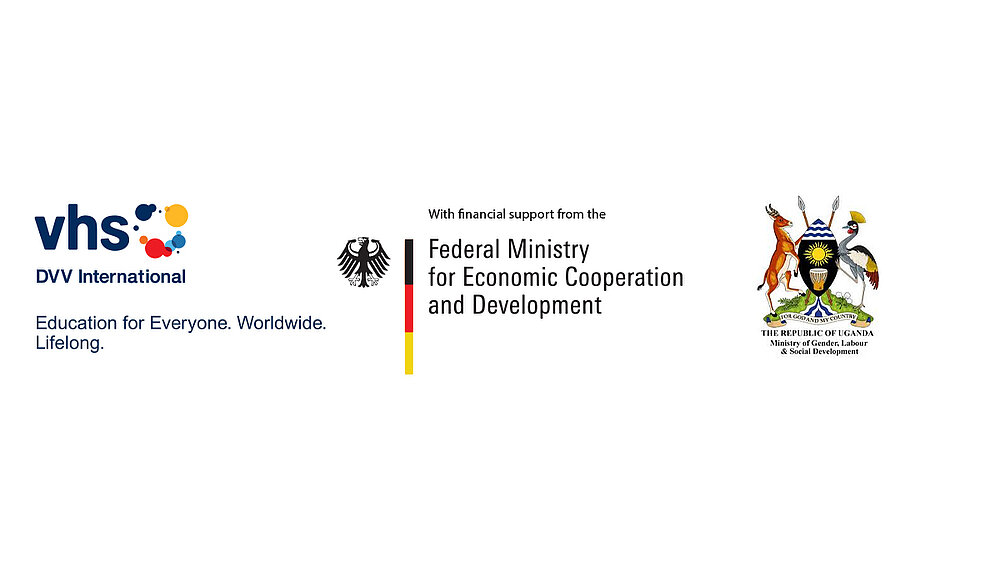Systematic adult education is a key component of human capital quality that is essential for employability, higher incomes, sustainable economic growth, and peaceful societies."
Mr. Everest Tumwesigye
During a recent parliamentary session in Berlin, Germany, the Commissioner for Community Development and Literacy at the Ministry of Gender, Labor, and Social Development in Uganda shared significant insights into Uganda’s Adult Learning and Education (ALE) in the presence of the Minister of the German Ministry of Economic Development and Cooperation. The event, titled "Hardly Known. Often Used. Social Structures for Social Challenges Worldwide," featured esteemed guests including the Director of DVV International, Uwe Gartenschlaeger, Ms. Gwendolyn T. Pang, Secretary General of the Philippine Red Cross, and Ms. Camila Japp from DGRV Brazil, alongside Minister Svenja Schulze.
A key focus of the evening was a presentation by Mr. Everest Tumwesigye, he provided a comprehensive overview of Uganda’s efforts in ALE, highlighting the pivotal role of Community Learning Centers (CLCs) and the collaborative efforts with DVV International. The discussion emphasized the transformative impact of these initiatives on communities and the necessity for continued support to sustain and expand these programs. Key areas discussed included successful approaches towards the establishment of a holistic national ALE system, the integration of multisectoral adult education services and the measurable milestones achieved through the about 10 years’ journey of cooperation with DVV International
A Collaborative Journey Towards Educational Empowerment
Nine years ago, Uganda started a partnership with DVV International, aiming to build a comprehensive national system of adult education. This collaboration has brought together government ministries, departments, and agencies in a unified effort to address the educational needs of out-of-school youths and adults. The Adult Learning and Education (ALES) System encompasses various elements that collectively create synergies for sustainable, effective, and efficient adult learning and community education programs.
Building a Sustainable Framework
Mr. Tumwesigye emphasized the importance of achieving sustainability through technical and financial support embedded within governmental structures. As a result of this support, the Integrated Community Learning and Wealth Creation (ICOLEW) Project was piloted as a national flagship program. Community Learning Centers (CLCs) are a vital aspect of the program, ensuring the provision of needs-oriented integrated adult education services at the community level, including basic education and literacy, health, agricultural skills, vocational training, and more. The Commissioner facilitated the proposal for the Ministry of Finance, Planning, and Economic Development to allocate a budget code for the ICOLEW program, thereby ensuring nationwide implementation and the expansion of CLCs.
Milestones and Achievements
Apart form the development, piloting and upscaling of ICOLEW programme, the progress in building the ALE system is marked by additional milestones:
- Consensus Building and Peer Review: A peer review process conducted in 2021 laid the groundwork for consensus on the current state and future direction of adult education in Uganda.
- National Strategy: The launch of the National Non-Formal Adult Learning and Community Education Strategy in 2023 signifies a significant achievement, supported by system assessments and collaborative efforts.
- Community Learning Centres: Establishing 11 functional CLCs across the country has brought education and essential services closer to underserved communities, embodying the concept of lifelong learning.
Impact on Communities
The ALE initiatives have had a profound impact on communities:
- Increased Literacy Rates: The adult literacy rate has improved from 72.2% in FY 2014/15 to 74% in FY 2019/20, empowering more individuals with the skills needed for socio-economic development.
- Financial Literacy and Economic Empowerment: Adult learners have cultivated a culture of savings, borrowing, and investing, with cumulative savings amounting to Uganda shillings 740,332,700 (approximately $197,422) between 2016/17 and 2018/19.
- Gender Equality and Empowerment: Educational programs have increased awareness of women's rights, improved self-esteem, and fostered gender equality, leading to greater female participation in governance and decision-making.
- Community Engagement: Communities are more actively participating in government programs, contributing to sustainable development and improved governance at local levels.
The Need for Continued Support
Mr. Tumwesigye emphasized the critical need for ongoing support to sustain and expand these initiatives.
"DVV International, with the support of BMZ and the Social Structure Promotion Instrument, has been able to build a long-term partnership with the Ministry and all relevant stakeholders in the process," he noted.
The collaborative efforts with DVV International have been instrumental in building a solid foundation for adult education in Uganda. Continued support will ensure the further development of the ALE system, reaching more individuals and communities, and fostering socio-economic transformation.
As we reflect on these achievements, it is clear that the work done so far has laid a robust groundwork for the future.
"Community Learning Centres bring education closer to the people and they bring to life the concept of lifelong learning," Mr. Tumwesigye explained.
The ALE initiatives are more than just educational programs; they are catalysts for change, empowering individuals and communities, and driving national development. It is crucial that these efforts receive the necessary support to continue making a significant impact.



